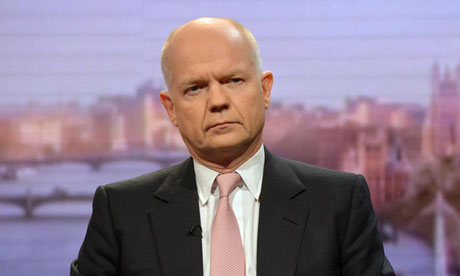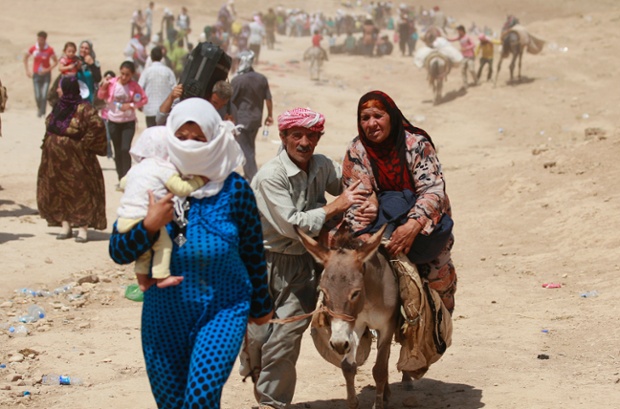Activists claim 1,300 killed in government rocket strike on residential area
- A UN team is in Syria to probe chemical weapons use by President Assad
- Hague says they should be given access to site to verify claims
- Claims come as refugees flood into Iraqi Kurdistan
Syrian activists accused President Bashar al-Assad’s forces of launching a nerve gas attack that killed at 1,300 people today, in what would be by far the worst reported use of poison gas in the two-year-old civil war.
Activists said rockets with chemical agents hit the Damascus suburbs of Ain Tarma, Zamalka and Jobar before dawn.
The accounts could not be verified independently and were denied by Syrian state television, which said they were disseminated deliberately to distract a team of United Nations chemical weapons experts which arrived three days ago.
While these pictures of dead children are graphic, disturbing and undoubtedly the worst so far to have emerged from the conflict, MailOnline has made the decision to publish them in order to raise awareness of the plight of innocent people.

Innocent: The dead bodies of Syrian children after an alleged poisonous gas attack fired by regime forces

Slaughter: Syrian activists inspect the bodies of people they say were killed by nerve gas in Damascus

The activists said at least 213 people, including women and children, were killedy in a nerve gas attack by President Bashar al-Assad’s forces
Meanwhile, fighting in strife-hit country has fuelled a mass exodus of refugees into Iraq and risks exploding into a full-blown side conflict as Kurdish militias battled against al-Qaida-linked fighters in the northeast.
The U.N. team is in Syria investigating allegations that both rebels and army forces used poison gas in the past, one of the main disputes in international diplomacy over Syria.
Syria must allow the UN inspectors immediate access to investigate claims that chemical weapons were used in the attack, William Hague has demanded.
The Foreign Secretary said that uncorroborated reports of toxic agents being used would mark a ‘shocking escalation’ if they are verified and warned that those who use them ‘should be in no doubt that we will work in every way we can to hold them to account’.
Mr Hague said: ‘I am deeply concerned by reports that hundreds of people, including children, have been killed in air strikes and a chemical weapons attack on rebel-held areas near Damascus.

Victim: A Syrian girl receiving treatment at a makeshift hospital, in Arbeen, Damascus

A Syrian boy is comforted as waits to receive treatment at a makeshift hospital in the aftermath of the poison gas attack
These reports are uncorroborated and we are urgently seeking more information. But it is clear that if they are verified, it would mark a shocking escalation in the use of chemical weapons in Syria.
‘Those who order the use of chemical weapons, and those who use them, should be in no doubt that we will work in every way we can to hold them to account.
‘I call on the Syrian government to allow immediate access to the area for the UN team currently investigating previous allegations of chemical weapons use. The UK will be raising this incident at the UN Security Council.’
A nurse at Douma Emergency Collection facility, Bayan Baker, said the death toll, as collated from medical centres in the suburbs east of Damascus, was 213.
‘Many of the casualties are women and children. They arrived with their pupil dilated, cold limbs and foam in their mouths. The doctors say these are typical symptoms of nerve gas victims,’ the nurse said.

Grim toll: Fighting in Syria has killed an estimated 100,000 people so far
Extensive amateur video and photographs purporting to show victims appeared on the Internet. A video puportedly shot in the Kafr Batna neighbourhood showed a room filled with more than 90 bodies, many of them children and a few women and elderly men.
Most of the bodies appeared ashen or pale but with no visible injuries. About a dozen were wrapped in blankets.
Other footage showed doctors treating people in makeshift clinics. One video showed the bodies of a dozen people lying on the floor of a clinic, with no visible wounds.
The narrator in the video said they were all members of a single family. In a corridor outside lay another five bodies.
A photograph taken by activists in Douma showed the bodies of at least 16 children and three adults, one wearing combat fatigues, laid at the floor of a room in a medical facility where bodies were collected.
Khaled Omar of the opposition Local Council in Ain Tarma said he saw at least 80 bodies at the Hajjah Hospital in Ain Tarma and at a makeshift clinic at Tatbiqiya School in the nearby district of Saqba.
‘The attack took place at around 3:00 a.m. (local time). Most of those killed were in their homes,’ Omar said.

Activists say most of those killed were in their homes

British Foreign Secretary William Hague says the gas attacks are a ‘shocking escalation’
Syrian state television quoted a source as saying there was ‘no truth whatsoever’ to the reports.
Syria is one of just a handful of countries that are not parties to the international treaty that bans chemical weapons, and Western nations believe it has caches of undeclared mustard gas, sarin and VX nerve agents.
Assad’s officials have said they would never use poison gas – if they had it – against Syrians. The United States and European allies believe Assad’s forces used small amounts of sarin gas in attacks in the past, which Washington called a ‘red line’ that justified international military aid for the rebels.
Assad’s government has responded in the past with accusations that it was the rebels that used chemical weapons, which the rebels deny.
Western countries say they do not believe the rebels have access to poison gas. Assad’s main global ally Moscow says accusations on both sides must be investigated.

Desperate: Syrian refugees cross into Iraq at the Peshkhabour border point in Dahuk

Around 30,000 Syrians, the vast majority of them Kurds, have fled the region over a five-day stretch and crossed the border to the self-ruled Kurdish region of northern Iraq
Arab League Secretary General Nabil Elaraby today called for United Nations inspectors to immediately investigate reports of the chemical attack.
‘The secretary general said in a statement he was surprised this deplorable crime would happen during the visit of a team of international investigators with the United Nations who are already tasked with investigating chemical weapons use,’ the official news agency MENA said.
‘He called on the inspectors to head immediately to the eastern Ghouta (suburb of Damascus) to determine what happened.’
The timing and location of the reported chemical weapons use – just three days after the team of U.N. chemical experts checked in to a Damascus hotel a few miles to the east at the start of their mission – was surprising.
‘Logically, it would make little sense for the Syrian government to employ chemical agents at such a time, particularly given the relatively close proximity of the targeted towns (to the U.N. team),’ said Charles Lister, analysts at IHS Jane’s Terrorism and Insurgency Centre.
‘Nonetheless, the Ghouta region (where the attacks were reported) is well known for its opposition leanings.
Jabhat al-Nusra has had a long-time presence there and the region has borne the brunt of sustained military pressure for months now,’ he said, referring to a hardline Sunni Islamist rebel group allied to al Qaeda.
‘While it is clearly impossible to confirm the chemical weapons claim, it is clear from videos uploaded by reliable accounts that a large number of people have died.’
The Syrian Observatory for Human Rights, a Britain-based monitoring group, said dozens of people were killed, including children, in fierce bombardment. It said Mouadamiya, southwest of the capital, came under the heaviest attack since the start of the two-year conflict.
The Observatory called on the U.N. experts and international organisations to visit the affected areas to ensure aid could be delivered and to ‘launch an investigation to determine who was responsible for the bombardment and hold them to account’.
Meanwhile, about 35,000 refugees, believed to be mainly Syrian Kurds, have entered Iraq since last Thursday, the U.N. refugee agency UNHCR said.
UNHCR officials told an internal U.N. meeting in Baghdad on Monday that up to 100,000 Syrian refugees could be expected to flee to Iraq within the next month, if the current pace continued, U.N. sources said.
Fleeing bombardments and sectarian tensions in parts of northern Syria including Aleppo and Efrin, they arrive exhausted, with many children dehydrated from walking in the scorching heat.
U.S. ‘OPPOSES INTERVENTION BECAUSE OF FEARS OVER SYRIAN REBELS’
The U.S. opposes even limited military intervention in Syria because it believes rebels fighting the Assad regime wouldn’t support American interests if they seized power today.
The Joint Chiefs chairman, Gen. Martin Dempsey, says the U.S. is capable of eliminating Syrian President Bashar Assad’s air force and shifting momentum back toward the opposition.
But he says this would commit the U.S. to another war and offer no peace strategy in a nation plagued by ethnic rivalries.
Dempsey says Syria is not about choosing between two sides. It means choosing one among many and that side must be ready to promote U.S. interests. He said: ‘Today, they are not.’
Dempsey’s assessment came in a letter to Rep. Eliot Engel of New York. A copy was obtained by The Associated Press.
Please follow and like us:


Leave a reply